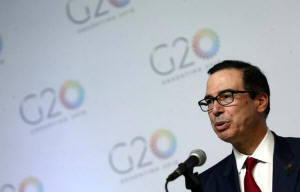|
Renewed sanctions need not mean U.S. exit
from Iran deal: Mnuchin
 Send a link to a friend
Send a link to a friend
 [April 12, 2018]
By Lesley Wroughton and Arshad Mohammed [April 12, 2018]
By Lesley Wroughton and Arshad Mohammed
WASHINGTON (Reuters) - A decision by U.S.
President Donald Trump not to renew sanctions relief for Iran on May 12
would not necessarily mean the United States had withdrawn from the 2015
Iran nuclear deal, U.S. Treasury Secretary Steven Mnuchin said on
Wednesday.
It was not immediately clear what Mnuchin meant by his comment but it
appeared to signal the Trump administration believes the agreement will
not necessarily collapse if Trump chooses not to extend U.S. sanctions
relief to Iran.
The crux of the 2015 agreement between Iran and six major powers -
Britain, China, France, Germany, Russia and the United States - was that
Iran would restrict its nuclear program in return for relief from
sanctions that have crippled its economy.
On Jan. 12, Trump delivered an ultimatum to Britain, France and Germany,
saying they must agree to "fix the terrible flaws of the Iran nuclear
deal" or he would refuse to extend the U.S. sanctions relief on Iran
that it calls for.

U.S. sanctions will resume unless Trump issues new "waivers" to suspend
them on May 12, although it is not clear how
quickly they would go into effect.
European officials saw Trump's Jan. 12 comments as a threat to kill the
deal. They have since been in negotiations with the Trump administration
to see if there is a way to salvage it.
Speaking at a congressional hearing, Mnuchin said the Trump
administration was in talks with allies and would "not do anything
abruptly."
"If the president decides not to sign that (waiver), it doesn't mean
we're necessarily pulling out of the deal. What it means is that the
primary and secondary sanctions will go back in place," he told the U.S.
House of Representatives Appropriations Committee.
The political directors of Britain, France and Germany met Brian Hook,
the State Department's director of policy planning, in Washington on
Wednesday to discuss the future of the pact, formally known as the Joint
Comprehensive Plan of Action, or JCPOA, two sources familiar with the
matter said.
It is not immediately clear how Iran might respond to a Trump decision
not to renew the sanctions waivers, but Tehran would be within its
rights to argue the United States violated its commitments to ease
sanctions even as Iran, as verified by international inspectors, had
kept its nuclear commitments.
[to top of second column]
|

U.S. Treasury Secretary Steven Mnuchin speaks during a news
conference at the G20 Meeting of Finance Ministers in Buenos Aires,
Argentina, March 20, 2018. REUTERS/Marcos Brindicci

U.S. nuclear experts say if Trump does not waive the sanctions in May,
it effectively kills the nuclear deal.
European diplomats have said that even if U.S. allies decide to remain
in the agreement, Western companies would withdraw from Iran because of
the threat of U.S. sanctions.
'ALL ABOUT LIFTING THE SANCTIONS'
Democratic Representative David Price pressed Mnuchin on the issue,
saying: "Are you saying that failing to waive the sanctions would not
constitute pulling out of the deal? The deal is all about lifting the
sanctions."
Mnuchin did not answer the question directly.
The secretary declined to speculate on what Trump might do, repeatedly
emphasizing he could not discuss the issue publicly.
Trump has voiced frustration at having to waive the sanctions again,
believing his predecessor, Democratic President Barack Obama, negotiated
a bad deal for the United States in agreeing to the accord.
Iran says its nuclear program is only for peaceful purposes. It has said
it will stick to the accord as long as the other signatories respect it
but will "shred" the deal if Washington pulls out.


(Reporting by Lesley Wroughton and Arshad Mohammed; Editing by Peter
Cooney)
[© 2018 Thomson Reuters. All rights
reserved.]
Copyright 2018 Reuters. All rights reserved. This material may not be published,
broadcast, rewritten or redistributed.
Thompson Reuters is solely responsible for this content. |